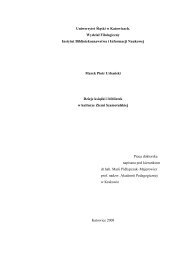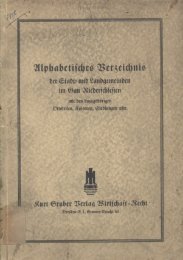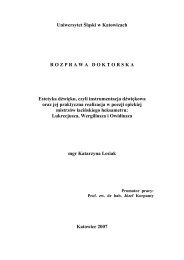Sonorant conspiracy135(26) a. before an empty nucleus b. before a full vowelGvt. Gvt.C|CV«C®RV|PC|CV«C®RV|VLic. Lic.In (26a) we have the representation of the word-final syllabic consonant.The sonorant is followed by the empty nucleus which, as in German, isnot allowed to govern the preceding schwa. In consequence, the governmentstrikes the sonorant. Additionally, the sonorant lacks a licensor asEnglish final empty nuclei are not allowed to license. This simply meansthat the sonorant appears in a weak position and in order not to fall preyto lenition it spreads to the left and docks on to the nuclear position. In(26b), on the other hand, the sonorant appears in the intervocalic position,before an audible vowel. The solution we propose here is that nucleiin English, be they empty or full, are not allowed to govern lexicallypresent vowels. It means that the sonorant under (26b) is both governedand licensed. The latter context, like the former one, represents a weakposition, 19 and hence the sonorant becomes syllabic. Furthermore, thissolution predicts the position in which syllabic consonants arise morefrequently. Thus, in the intervocalic position they are optional, dependingon the tempo of speech; however, before a governed empty nucleusthe sonorant gets syllabic more readily. This fact falls out naturally fromthe lenition theory, i.e. the Coda Mirror, where the intervocalic positionis less ‘destructive’ than the position before a governed empty nucleus(see Ségéral and Scheer 1999).It has already been mentioned in the body of this chapter that thesonorant spreading ability contributes to the existence of heavy consonantclusters of up to even five consonants in a row, e.g. singleton [ ® sINg®lt ®n].This is possible since, as was mentioned in Chapter Two (section 3.5),the nucleus invaded by the following sonorant can dispense governmentjust like a regular vowel. It should be borne in mind, however, that neithersyllabic consonants nor regular vowels are able to govern lexicallypresent nuclei. To put it differently, they can govern only nuclei which arelexically empty (27).19Recall the discussion concerning the theory of lenition — The Coda Mirror inChapter Two (section 4.3).
136 Bogus clusters, syllabic consonants and vowel syncope. . .(27) PGCV|ÏC|mV|PC|pVCV|P«®lIn (27) the lateral [l] appears before a final empty nucleus, hence itis governed but unlicensed and this, according to the Coda Mirror, isa weak position. The sonorant spreads to the left and displaces the schwa.The nuclear position occupied by the sonorant is not empty, whichmeans that it can function as a governor and govern the precedingempty nuclear position. In consequence we arrive at the three-consonantcluster. Similar examples can be multiplied, e.g. napkin [ ® nÏpk ®n], twinkle[ ® twINk®l], falcon [ ® fOÉlk ®n], husband [ ® h¿zb ®nd] faculty [ ® fÏk®lti], etc. Asmentioned above, what syllabic consonants, vowels and final empty nucleihave in common is the ability to govern lexically empty nuclei. All threestructures, however, never govern vowels which are lexically present.This is clearly observable in the case of faculty [ ® fÏk®lti], arrogant [ ® Ïr«g ®nt],cavalry [ ® kÏv®lri]. Thus, in such forms a syllabic consonant is not ableto govern the preceding nuclear position simply because it is not empty.Furthermore, given the forms containing two sonorants in a row beforean empty nucleus, e.g. shrapnel, grapnel, we should wind up with twoconsecutive syllabic consonants. This is, however, not the case here asthe first sonorant is preceded by an empty position which is properly governedby the second sonorant which is syllabic, e.g. [ ® SrÏpn®l] and [ ® grÏpn®l]respectively. In other words, the nuclear position between [p] and [n]is lexically empty, which means that it can be properly governed. This canbe done by the nuclear position occupied by the syllabic consonant. Inconsequence, the nasal [n] appears in a strong position, i.e. it is licensedbut ungoverned, and does not have to spread to the left to survive. Note,however, that the solution offered here predicts two syllabic consonantsin a situation where both sonorants are preceded by the schwa, e.g. general[ ® dZen®r®l], marginal [ ® mAÉdZ ®n®l], personal [ ® päÉs ®n®l], national [ ® nÏS ®n®l], etc. 20Two syllabic consonants in one word do appear but in the vast majorityof cases they are separated by at least one obstruent. This is illustrated20We have managed to confirm the existence of personal [ ® päÉs ®n®l] only (Jones EnglishPronouncing Dictionary 12 th ed.). In Harris (1994:185) such forms are the representativesof a different phenomenon, that is, vowel syncope, hence they are represented as[ ® dZenr«l], [ ® mAÉdZn«l], [ ® päÉsn«l], [ ® nÏSn«l], respectively. We shall return to such forms in theimmediately following sub-section.
- Page 2 and 3:
Polish and EnglishConsonantal Clust
- Page 4 and 5:
Artur KijakPolish and EnglishConson
- Page 6 and 7:
ContentsPreface . . . . . . . . . .
- Page 8 and 9:
PrefaceThe phonotactic peculiaritie
- Page 10 and 11:
Preface92000), Ploch (1999), van de
- Page 12:
List of abbreviationsBrODIdim.FODge
- Page 15 and 16:
14 The frameworkemploying the simpl
- Page 17 and 18:
16 The frameworksion in section 3 b
- Page 19 and 20:
18 The frameworkmodel is able to ha
- Page 21 and 22:
20 The frameworkhanan 1986). Thus,
- Page 23 and 24:
22 The frameworkare not derived at
- Page 25 and 26:
24 The frameworkWhat is interesting
- Page 27 and 28:
26 The frameworklateral relations,
- Page 29 and 30:
28 The frameworkIn general, we can
- Page 31 and 32:
30 The frameworkobstruents followed
- Page 33 and 34:
32 The frameworkLet us look more de
- Page 35 and 36:
34 The framework(7) PGO N O N O N O
- Page 37 and 38:
36 The frameworkby all sounds. Thus
- Page 39 and 40:
38 The frameworkexist. What is a Br
- Page 41 and 42:
40The frameworkLowenstamm’s (1999
- Page 43 and 44:
42 The frameworksky and Halle’s (
- Page 45 and 46:
44 The phonological nature of the b
- Page 47 and 48:
46 The phonological nature of the b
- Page 49 and 50:
48 The phonological nature of the b
- Page 51 and 52:
50 The phonological nature of the b
- Page 53 and 54:
52 The phonological nature of the b
- Page 55 and 56:
54 The phonological nature of the b
- Page 57 and 58:
56 The phonological nature of the b
- Page 59 and 60:
58 The phonological nature of the b
- Page 61 and 62:
60 The phonological nature of the b
- Page 63 and 64:
62 The phonological nature of the b
- Page 65 and 66:
64 The phonological nature of the b
- Page 67 and 68:
66 The phonological nature of the b
- Page 69 and 70:
68 The phonological nature of the b
- Page 71 and 72:
70 The phonological nature of the b
- Page 73 and 74:
72 The phonological nature of the b
- Page 75 and 76:
74 The phonological nature of the b
- Page 77 and 78:
76 The phonological nature of the b
- Page 79 and 80:
78 The phonological nature of the b
- Page 81 and 82:
80 The phonological nature of the b
- Page 83 and 84:
82 The phonological nature of the b
- Page 85 and 86: 84 The phonological nature of the b
- Page 87 and 88: 86 The phonological nature of the b
- Page 89 and 90: 88 The phonological nature of the b
- Page 91 and 92: 90 The phonological nature of the b
- Page 93 and 94: 92 The phonological nature of the b
- Page 95 and 96: 94 The phonological nature of the b
- Page 97 and 98: 96 The phonological nature of the b
- Page 99 and 100: 98 The phonological nature of the b
- Page 101 and 102: III. Bogus clusters, syllabic conso
- Page 103 and 104: 102 Bogus clusters, syllabic conson
- Page 105 and 106: 104 Bogus clusters, syllabic conson
- Page 107 and 108: 106 Bogus clusters, syllabic conson
- Page 109 and 110: 108 Bogus clusters, syllabic conson
- Page 111 and 112: 110 Bogus clusters, syllabic conson
- Page 113 and 114: 112 Bogus clusters, syllabic conson
- Page 115 and 116: 114 Bogus clusters, syllabic conson
- Page 117 and 118: 116 Bogus clusters, syllabic conson
- Page 119 and 120: 118 Bogus clusters, syllabic conson
- Page 121 and 122: 120 Bogus clusters, syllabic conson
- Page 123 and 124: 122 Bogus clusters, syllabic conson
- Page 125 and 126: 124 Bogus clusters, syllabic conson
- Page 127 and 128: 126 Bogus clusters, syllabic conson
- Page 129 and 130: 128 Bogus clusters, syllabic conson
- Page 131 and 132: 130 Bogus clusters, syllabic conson
- Page 133 and 134: 132 Bogus clusters, syllabic conson
- Page 135: 134 Bogus clusters, syllabic conson
- Page 139 and 140: 138 Bogus clusters, syllabic conson
- Page 141 and 142: 140 Bogus clusters, syllabic conson
- Page 143 and 144: 142 Bogus clusters, syllabic conson
- Page 145 and 146: 144 Bogus clusters, syllabic conson
- Page 147 and 148: 146 Bogus clusters, syllabic conson
- Page 149 and 150: 148 Bogus clusters, syllabic conson
- Page 151 and 152: 150 Bogus clusters, syllabic conson
- Page 153 and 154: 152 Conclusionnisms available in th
- Page 155 and 156: 154 ReferencesBotma, B. (2004) Phon
- Page 157 and 158: 156 ReferencesGussmann, E. (1998) D
- Page 159 and 160: 158 ReferencesPawelec, P. (1989) Cy
- Page 161 and 162: 160 ReferencesScheer, T. (1997) Vow
- Page 164 and 165: Author indexAbercrombie, David 103A
- Page 166 and 167: Artur KijakGrupy spó³g³oskowe w
- Page 168 and 169: Zusammenfassung167für alle anderen
















